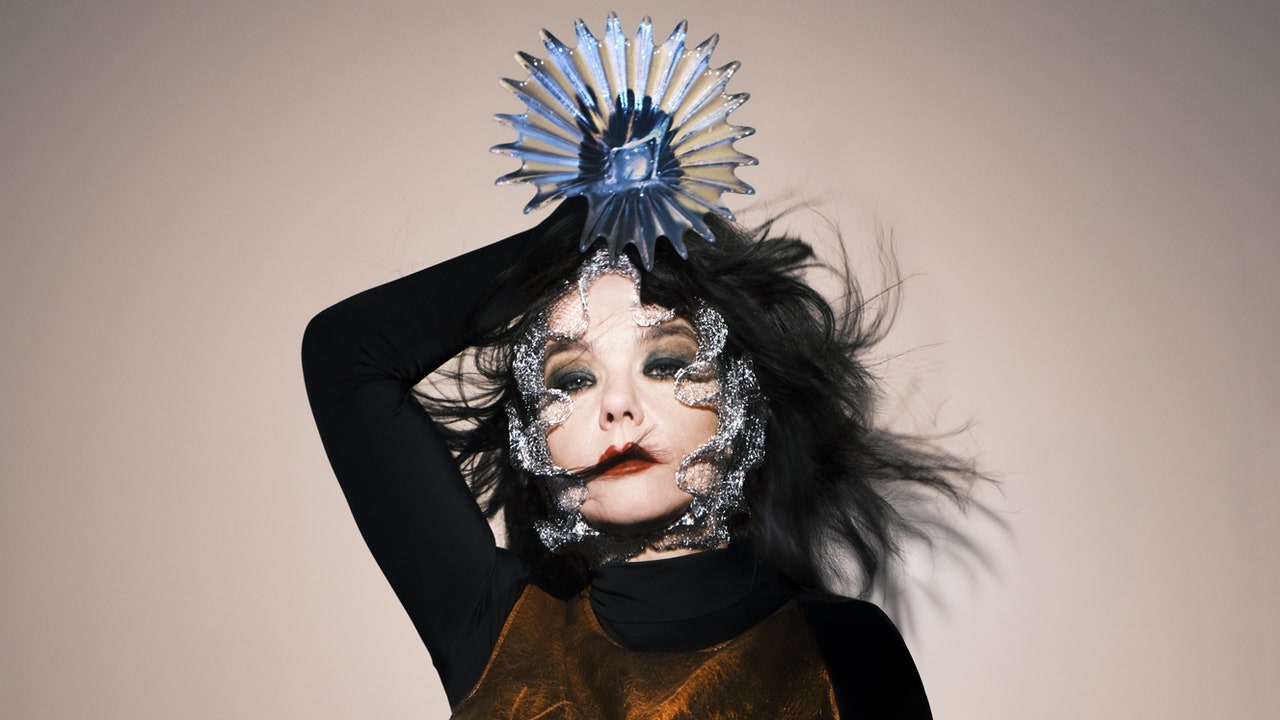We were supposed to meet in Iceland, but Björk looked at her calendar and realized that if she didn’t take a holiday right this second there would “never, ever be one, ever.” She needed a break; she has just finished work on a film, Cornucopia, that is the culmination of 10 years of her life. It documents one night, in Lisbon, of a five-year, 45-date world tour whose production was so elaborate that the film begins with a written statement trying to explain it; the set was a “monster” so elaborate to transport that Björk did other stripped-back shows—“Björk Orkestral,” where she would turn up at the venue with nothing but a dress in a bag—to pay for it. “I did say to my manager, Listen, I will only do this one time—sorry!” she says, laughing. “Even though it’s sold-out, it doesn’t pay for moving all these screens everywhere.…”
GQ: Why was this live show so complex?
Björk: I had been working in VR and 360 visuals for a few years. I was just thinking in 360, and I was working with a lot of animators: seven VR videos with seven different teams. A lot of this stuff, some of it was in the VR videos that a lot of people didn’t see, even though we took that to 19 cities. It’s very particular people that go to a digital exhibition to stand in a queue and see VR. And then I was like, “Okay, this is very elitism. How many people own a headset? Let’s bring it out of the headset and put it on a 19th-century stage.”
When we started working on it, we got 27 screens—they open and close; that had never been done before. And also in the back there’s an LED screen that’s high-def, and then in front of that is normal projection, and then there’s a gauze that goes in front of it. We were trying to create magica lanterna for the 21st century. We were trying to make VR analog.
Björk’s Cornucopia concert in Lisbon, 2023.Courtesy of Santiago Felipe
The songs in the show jump around from different albums, largely from the last 10 years, but together they tell a story of “a modern marionette who alchemically mutates, from puppet to puppet, from the injury of a heart wound into a fully healed state.” How did you pick them?
I would say that Vulnicura [2015] was obviously a heartbreak album, and it was quite the saddest thing I’ve ever done—and a dark thing. So Utopia [2017] was the inventing of a new world. It was very like, Oh, this apocalypse has happened, let’s go take the women and the children and go to some island with no conflict and play flutes. And so it was kind of almost like a sci-fi story, on purpose, like a fantasy. But I thought it was helpful because when you start from scratch building something, then you need to start in a very ideal way, in some ideal place.
Saying it goes straight from a heart wound to a fully healed state is an oversimplification of the story, as anyone who’s had a broken heart will know.
Yes. The tail of the dinosaur comes and you have to deal with it. Which is songs like “Sue Me,” but it’s random in life anyway, how that works out. You kind of have something that feels bad that happens to you, and then straight after, you fix it and work it out. And then after that, maybe suddenly three years later, the tail of that hits you back. So time is kind of irrelevant anyway.
I wondered how much of the Cornucopia story was autobiographical in a larger sense. Are you the marionette?
Am I the marionette? [Laughs] I mean, I think it’s a bit of both, of course. Sometimes when you are trying to be superpersonal and you try to boil the essence out, and then you come out with a sentence, and then other people read it and they go, “Oh, that’s so universal,” and the other way around. What’s so great about music is you can map out all the emotions there are, if such a map exists, and then you would put a song that fits each emotion in each box. Sometimes you are writing a song and the verses are what happened to you, it’s very personal, but the choruses are something that happened to your friends five years earlier, but it is the same emotion. It’s dealing with the same thing.
The songs I’ve written that most people think, “Oh, that’s obviously a love song,” like “Come to Me”—a really old song of mine—that’s written to two friends. The verse is to one friend and the chorus is to another friend, but it’s definitely not erotic. So people go, “Oh, that’s so sexy. What a sexy song.” And I’m like [Björk looks confused], “Thanks!” And then some other songs that for me are super erotic, I will hide it so much that people don’t notice it, because it’s so precious to me that I want it to be a secret between me and the lover. So it is kind of random, you know?

